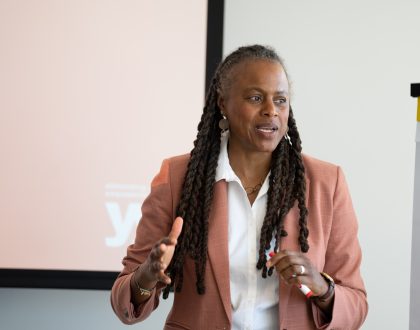YW Boston’s President and CEO Beth Chandler to Testify in Support of Wage Equity

BOSTON —On Tuesday, May 9, YW Boston President and CEO Beth Chandler will testify in support of the Wage Equity Now Coalition to pass Massachusetts House Bills 1849 and 1940 and Senate Bills 1191 and 1181. The passage of these bills will help advance the work being done to eradicate the racial and gender wealth gap and ensure that women and people of color are better positioned to support themselves, their families, and their communities.
Read Beth’s testimony below to learn more about the bills, why they are important, and the work YW Boston is doing to advocate for wage equity:
Good afternoon, Chair Jehlen, Chair Cutler, and members of the Joint Committee on State Administration and Regulatory Oversight. Thank you for your time today. My name is Beth Chandler, and I am the President and CEO of YW Boston, an organization dedicated to eliminating racism, empowering women, and promoting peace, justice, freedom, and dignity for all. YW Boston has been leading the fight to advance social equity in the city of Boston for more than 150 years.
I am speaking today in support of House Bills 1849 and 1940 and Senate Bills 1191 and 1181, which will help advance gender and racial equity in the Massachusetts workplace. YW Boston is on the steering committee of the Wage Equity Now coalition and is proud of the work being done by this coalition to close the wage gaps in Massachusetts.
YW Boston is excited to have been doing our diversity, equity and inclusion work for over five years now in its current iteration. We’ve partnered with organizations across all sectors, collecting a trove of data that illuminates gaps in the workplace particularly by race and gender. Yet, inequities can’t be addressed if they aren’t visible. So, we made a commitment this year to add capacity to our data team so that we can analyze the data we collect and share our learnings to show strategies that effectively decrease inequities within organizations. I look forward to sharing those learnings with others. Yet, we cannot do this alone. We need other companies and organizations to join us in transparency and collection as a means to eradicate the wealth gap.
House Bill 1849 and Senate Bill 1191 call on employers to disclose salary ranges to employees who ask for them when hiring for positions, and House Bill 1940 and Senate Bill 1181 require companies and municipalities to submit their federally required EEOC data to the Massachusetts Secretary of State’s office. This information would then be combined with state-wide- figures to provide aggregate and accurate reports of the wage gaps within various business sectors that can be seen and understood both by workers and employers. We cannot change what we cannot see.
As YW Boston, we believe in wage transparency as a way to improve equity. Every 2 – 3 years we hire an external consultant to conduct a compensation analysis to determine how competitive we are with organizations with a similar budget and staff size. Salary scales are set according to an explicit compensation policy, and relevant market data is analyzed when setting ranges for each role. To ensure internal parity, YW Boston analyzes the candidate’s overall number of years of experience as well as relevant experience pertaining to the position and in comparison, with staff in the same job group to make the salary offer. Because salary ranges are small and the internal parity review is thorough, offers are firm. This ensures a level of transparency that when we post a range, we mean that range. It also prevents us from rewarding candidates with strong negotiation skills since these skills can often come from privileged positions. Additionally, we disclose our salary and demographic data with organizations like Boston Women’s Workplace Council to increase awareness of wage gaps.
Together, these bills will have a profound impact on longstanding structural biases in the workplace, which result in serious racial and gender wage gaps that continue to harm those historically marginalized. To help women make real gains towards eliminating the wage gap and to help ensure that Massachusetts attracts and retains the best employees, we need to pass these bills.
In order to promote equitable economic growth in our Commonwealth, I ask that you work with your fellow lawmakers to combine these bills and report them favorably from committee.
Respectfully,
Beth Chandler
President and CEO
YW Boston
To learn more about the work YW Boston is doing to dismantle inequitable systems and uplift those who are historically left behind, visit ywboston.org/our-work/advocacy.
